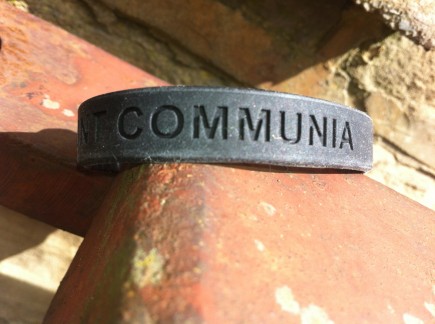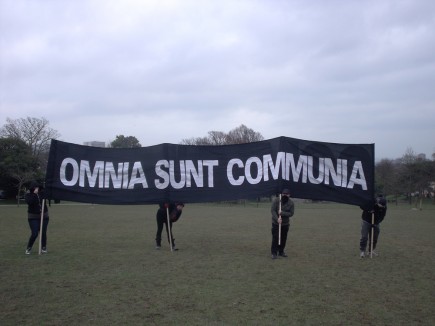It says w..w..w..watch out!
As we’ve written elsewhere, history doesn’t move in straight lines. Instead it leaps about by jolts and ruptures, sudden breaks and new pathways. At many of these rupture points, new battle-cries are sounded. The Argentinazo of 2001 rocked to the rhythm of “Que se vayan todos” (“They all must go”). The current 15-M movement in Spain – the indignados – has popularised the chant “Que no, que no, que no nos representan” (“No, no, they don’t represent us”). But these ruptures have a peculiar relationship to time. They break history, hurling it off its tracks, but in doing so they also draw on earlier events, looping back to pick up struggles and ideas from many years ago. So while they represent the emergence of new movements, these ruptures also express the age-old desire for a world free of domination. It’s the stutter of history.
“Omnia sunt communia” is one of those stutters – a Latin phrase which translates as “all things are held in common”. It allegedly dates back to Thomas Aquinas, but it’s most widely associated with Thomas Müntzer. Müntzer was a radical theologian who became a rebel leader during the German Peasants’ War of 1524–1525, the largest and most widespread popular uprising in Europe before the French Revolution.
“It was their article of belief and they wanted to establish this principle, ‘All property should be held in common’ (Omnia sunt communia) and should be distributed each according to their needs as the occasion required. Any prince, count, or lord who did not want to do this, after first being warned about it, should be beheaded or hanged.”
Müntzer was eventually captured, tortured and decapitated but the slogan took hold. As the Solidarity Federation explains, “it expresses the idea that the world belongs to everyone, in contrast to the way society has been organised for so long where most are dispossessed and dominated so that some can enjoy all the benefits.”
We probably first came across this phrase in the brilliant Q by Luther Blissett (the writing collective which later became Wu Ming). It’s a sprawling story of revolt across Germany, Italy and Netherlands as radical Anabaptists fight both against Catholicism and the emerging Reformation church. Here’s a taster:
‘So tell me… That preacher, that prophet, that, um, the tough bloke, what’s his name…? Oh yes: Müntzer. The Coiner. What happened to him?’
Careful.
‘They got him.’
‘He’s not dead?’
‘No. I saw him being carried away. A member of the troop who caught him told me he fought like a lion, getting him was difficult, the soldiers were intimidated by the look on his face and the words he was coming out with. While they were carrying him away on the cart you could still hear him shouting, “Omnia sunt communia!”’
‘And what the fuck does that mean?’
‘Everything belongs to everyone.’
So why is this important? Why on earth would we want to get it written on our bodies or have it stamped into wristbands (see top photo)?
Well, it reminds us in the most obvious way that the struggle, and indeed demand, for a world free of domination recurs again and again throughout human history. Yet while knowledge of history’s stutter might give us hope in dark times, it is not a sign of inevitable victory. We are done with the consoling idea that history will ultimately prove us right. Our focus, instead, is on how it can change what we do here and now. Hic Rhodus, hic salta.
As new generations of struggle emerge we need a certain flexibility of thought if we are to recognise what’s new in the situation. Political groups who fail this task end up as historical re-enactment societies: always already restaging 1917, 1936 or 1999. Veterans of past struggles must also practise some forgetting if they are to be the memory of the class. But what are we to forget and what are we to remember? Amidst this flexibility a glimpse of the horizon can help us to get oriented.
We must immerse ourselves in actually existing struggles and real movements. There is nowhere else to start, yet this presents real problems. Those movements and struggles, emerging as they are from contemporary society, are partially structured and limited by what currently seems possible. Yet when we look back at history we know that what seems politically and socially possible changes over time. The historical recurrence of the demand for a society of non-domination provides us with a reminder not to settle for what exists.
This is our take on what Jodi Dean calls the “communist horizon”:
With communism as our horizon, the field of possibilities for revolutionary theory and practice starts to change shape. Barriers to action fall away. New potentials and challenges come to the fore. Anything is possible.
Omnia sunt communia, written indelibly on the skin (or worn on the wrist), can provide that horizon. It can stop us settling for less by acting as a bridge between what is and what could be. The task of course is to work out the phrases and practices with which people say the same thing today.
Oh and if you bump into us, don’t forget to ask for a bundle of wristbands – we’ve got a whole stack to give away. Or you can even drop us a line here.
(This is not our banner – but we love it)



1 Comment